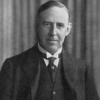Samuel Alexander

Samuel Alexander
Samuel Alexander OMwas an Australian-born British philosopher. He was the first Jewish fellow of an Oxbridge college...
NationalityAustralian
ProfessionPhilosopher
Date of Birth6 January 1859
CountryAustralia
psychology details different
Such being the nature of mental life, the business of psychology is primarily to describe in detail the various forms which attention or conation assumes upon the different levels of that life.
phrases may lasts
It may be added, to prevent misunderstanding, that when I speak of contemplated objects in this last phrase as objects of contemplation, the act of contemplation itself is of course an enjoyment.
reflection class ideas
But unfortunately Locke treated ideas of reflection as if they were another class of objects of contemplation beside ideas of sensation.
perception
The thing of which the act of perception is the perception is experienced as something not mental.
oil demand surprise
... when demand is being destroyed by expensive oil just as expensive oil is incentivising increased production - it should come as no surprise that at some point the markets would react.
mind perception reactions
The perceptive act is a reaction of the mind upon the object of which it is the perception.
swag two kind
It is convenient to distinguish the two kinds of experience which have thus been described, the experienc-ing and the experienc-ed, by technical words.
names sides individualism
It is more difficult to designate this form of conation on its practical side by a satisfactory name.
firsts expected objects
An object is not first imagined or thought about and then expected or willed, but in being actively expected it is imagined as future and in being willed it is thought.
memories practice facts
When we come to images or memories or thoughts, speculation, while always closely related to practice, is more explicit, and it is in fact not immediately obvious that such processes can be described in any sense as practical.
memories expectations good-memories
Both expectations and memories are more than mere images founded on previous experience.
expectations objects belonging
An expectation is a future object, recognised as belonging to me.
psychology deals whole
Psychology is the science of the act of experiencing, and deals with the whole system of such acts as they make up mental life.
tree perception
In the perception of a tree we can distinguish the act of experiencing, or perceiving, from the thing experienced, or perceived.